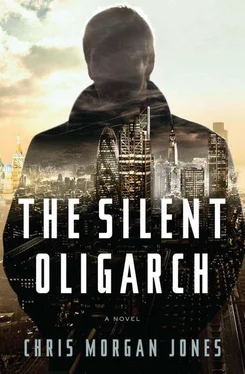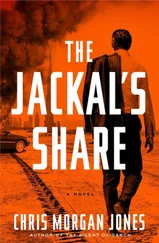Lock felt a new energy inside him. He had had an idea: for the first time in years, a positive idea about his own fate. Now all he had to do was find the courage to act on it.
Café Pushkin was a re-creation of a rich Russian’s town house from the first twenty years of the nineteenth century. It was pedantically, absurdly authentic: huge, worn flagstones covered the ground floor and wood paneling the walls throughout. The cloakroom, in the cellar, was appropriately dank. In the library, on the first floor, where Lock had booked his table, and where real oak bookshelves held real Russian books, a brass telescope and a Victorian globe sat by huge sash windows, as if the owner of the house, an amateur scientist perhaps, had merely stepped outside for a moment and invited you to improve yourself while he was gone. From the cream-white walls brass sconces gave out fake candlelight. Lock liked it here because in among the fashionable Russians, who more than a decade on still came here, were tourists and even middle-class Muscovites celebrating. It felt democratic in a way that much of Moscow did not.
It took them a while to find his reservation but then it always did. He waited patiently while his waitress, dressed in a burgundy waistcoat and apron, slowly extracted it from the computer, an ugly anachronism in the warm light. Finally he sat, and ordered a gin and tonic. Oksana would of course be late. He read the menu: Russian food: blinis, pelmeni, solyanka, borscht, caviar, sturgeon, stroganoff. He would have the solyanka as he always did, and then maybe some duck. His drink came, and he poured a small amount of tonic into the glass: like the water and the wine, he told himself.
If he moved his flight to the evening he could make a start on his file tomorrow morning. All he needed to do was download everything on the network. It would probably fit on a single memory stick—two at the most. That would leave a record, of course, but he was the administrator of the system and in all his time working for Malin no one had ever inspected it. And he could always say that he’d needed to take it all to London and Paris. He should make a copy or two, and leave them somewhere secret but accessible. One in Moscow, one in London perhaps. Marina could look after one. If this was one of those thrillers I halfheartedly read, he thought, I would entrust one to my lawyer and have him publish it should anything terrible happen to me, but I don’t have a lawyer and even if I did no one would publish the little I know. We could always vanity-publish. He smiled at the thought, wondered whether Oksana would be much longer and ordered another drink.
That is the problem with this scheme, he thought. My value to Malin relies solely on my not being him. I don’t actually know very much. I’m not important enough to know things. The one devastating thing that I know is that I’m a fraud, but that in itself is not enough to finish Malin. And the hard irony is that Malin probably doesn’t know that—or can’t afford to believe it. He thinks I’m more dangerous than I am.
His second drink arrived. He looked at his watch. Twenty past. Oksana could be another twenty minutes. He sipped his gin and tried to remember what she had been doing that day; there was something at the university. He couldn’t, and returned to his new project. How to find out how Malin stole? For a long time he considered this without a single thought occurring to him. God, he thought: I am no spy.
As he tilted his head back to finish the last of his drink he saw Oksana arrive, stately in black, a head taller than the waitress who led her to the table. For a moment it occurred to him that she would make a perfect accomplice. She had poise and coolness enough for the both of them. He stood to greet her and they kissed. On his empty stomach the gin was making him feel warm and slightly giddy. He ordered another and a vodka for Oksana. She looked around the room and took a long time to settle herself on her chair; she seemed exercised about something. Her long nails, painted a deep red, rapped on the tabletop.
“You look amazing.”
“Thank you, Richard. This is a good table.”
“Of course. How was your day?”
“Hm. Not so good. Unbelievable in fact. I need that drink.” She looked around for the waitress.
“She’ll be here soon. What’s wrong?”
“Nothing.” She met his eye but couldn’t hold it. “Just a bad day.”
“Tell me.”
She sighed. “All right. Christ. It’s that little fucker Kovalchik. I had a review with him today, you remember?” Lock gave a grave little nod. “I hadn’t seen him since the summer, not since I decided to include those chapters on the Gulag. So we go over the new plan, and he tells me that the Gulag is not a ‘profitable’ area of research. Too many people have already written about it, apparently. Academic exhaustion. But you can’t write about… ah, at last. Bring me another, please.” She took her shotglass, held it up to Lock, and knocked it back. “You cannot write about displacement without mentioning the Gulag. Hundreds of thousands of people began life—if you can call it that—began life in Kazakhstan because they were sent to the gulags. Idiot.” She played with her empty glass. “Idiot.”
Lock waited for a moment to see whether she had finished. Could he not discuss his plan with her? She was from Almaty. She was a foreigner, more or less. “So what does that mean?”
“That means I have to go back to the original plan and scrap everything I’ve done for the last three months. Or I carry on and risk being failed.”
“Would he do that?” He should talk to her. She might be the difference between doing it and just thinking about it forever. When they had finished discussing Kozlovsky or whatever his name was he would test the ground.
“Oh yes. Yes, he would. He’s a nasty little shit.”
“Who does he report to?”
Oksana gave a hard, short laugh. “Maybe I could have him sacked?”
“No, that’s not what I mean. Do you have any right of appeal? Can someone have a word with him?”
“He’s my professor. If I piss him off I won’t get another one.” She had stopped fidgeting now and looked at him with a coldness he didn’t enjoy. “Not every problem can be solved by finding a bigger bully, Richard. Even in Russia. You should understand that.”
“What do you mean?”
“I know who you are, Richard. You have a pretty unpleasant boss of your own.”
“I don’t follow you.”
“Never mind. Never mind. Let’s just have a nice dinner like we always do. You can pretend to be interested in my thesis.”
“I am interested in your thesis.”
She laughed again. “You know, when I first met you I liked you. We have an arrangement, I know that, but I liked you. Here’s a man, I thought, who knows things, who doesn’t care only for money. Here’s a man with self-respect. And then I see the papers and I see what you do. For that slug. It saddens me, Richard. I can’t tell you how much. You should have been more than this.”
She held his eye for a moment and then stood up.
“I’m sorry, Richard. I didn’t want to be disappointed by you. Let me know if I owe you anything.”
Lock watched her as she walked away, betraying no emotion in her even stride. The waitress came and put new drinks on the table. Lock drained Oksana’s vodka and sat for some time watching the space she had left.
“MY NAME IS Richard Lock.”
“Thank you, Mr. Lock. And can you tell us in what capacity you are here today?”
“I am here as a representative of Faringdon Holdings, one of the companies named in Mr. Tourna’s complaint.”
“Very good. Let me start with some establishing questions. What is Faringdon’s business, Mr. Lock?”
Читать дальше












